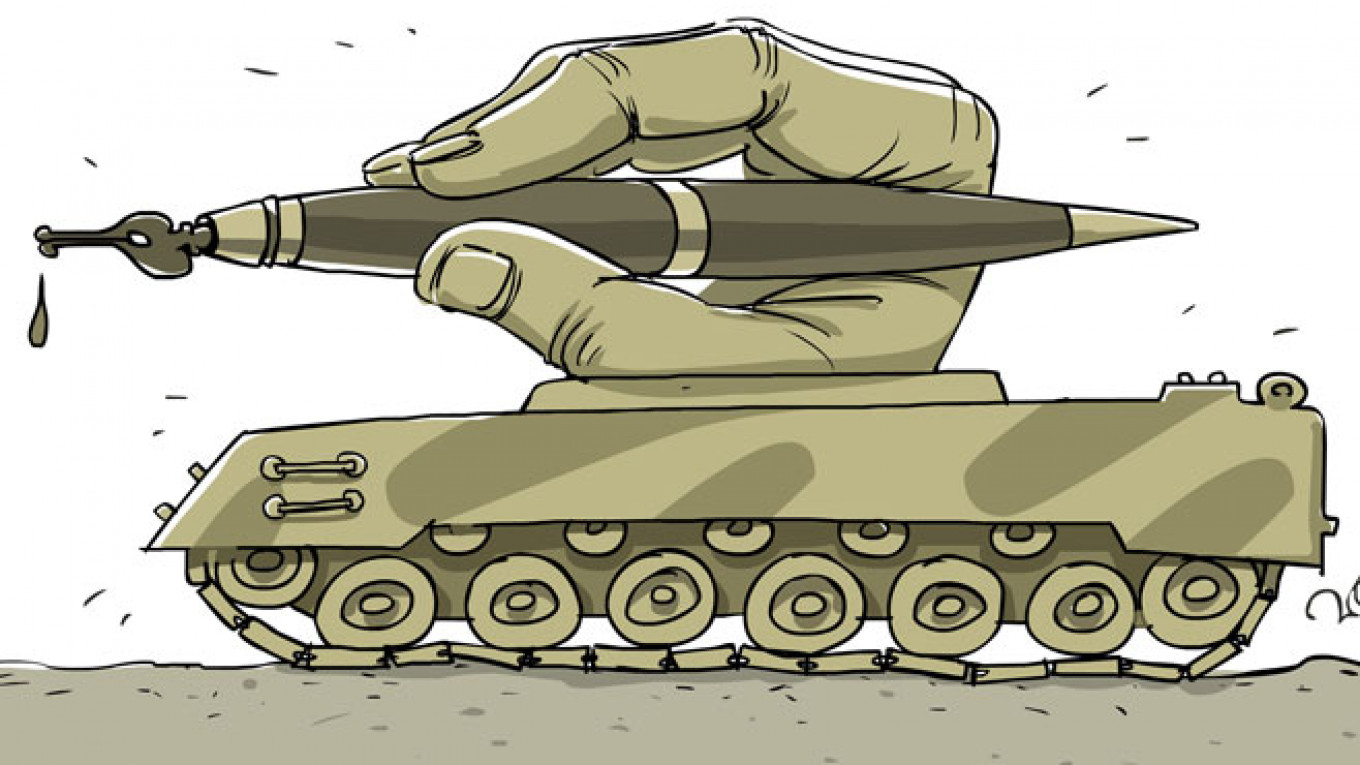A dispute on that unfolded on Facebook this weekend showed that many journalists writing about Russia need to spend a lot less time caring about which "team" they're playing for and a lot more time getting their facts straight.
Masha Gessen hardly needs an introduction. As a contributor to The New York Review of Books, The New York Times, The Washington Post, and a slew of other magazines and newspapers, she's one of the most recognizable people writing about Russia in the Western media. While she's probably best known for ''Words Will Break Cement,'' her generally well-reviewed, and extremely well-timed, book about Pussy Riot, most of Gessen's output is focused on the general horribleness of Russian President Vladimir Putin and the government over which he presides.
Gessen takes an apocalyptic view of modern Russia, and generally regards with contempt bordering on disgust anyone who suggests that, just maybe, things aren't quite as bad as they seem.
Always a bit of a verbal bomb-thrower, Gessen recently threw the small, self-contained, and usually rather placid world of Russia watchers into a state of chaos. The actual details of the dispute are somewhat mysterious. Kevin Rothrock, the project editor of RuNet Echo, has provided a detailed blow-by-blow account for those who are interested, but the general gist is the following: Gessen was supposed to appear on a radio show with another Russian journalist, Anna Arutunyan, but stormed off the set upon discovering that Arutunyan "worked for the Kremlin propaganda holding Russia Today ... and for the English-language Voice of Russia."
Now as it turns out that, purely as a factual matter, Arutunyan never worked for RT or for the Voice of Russia. Rather, Arutunyan worked for the Moscow News, a generally liberal publication that was closed down during the recent reorganization of RIA Novosti.
Rather than being a shock trooper for Putinism, as Gessen quite shamefully suggested, Arutunyan is actually one of its victims: The outlet she previously worked for no longer exists because the Kremlin has decided to tighten the screws on dissent. To the extent that she confronted someone fired for her liberal views with accusations of Kremlin patronage that are simply untrue, Gessen clearly owes Arutunyan an apology.
But what if Arutunyan had worked for RT or Voice of Russia? What if she had actually been the person that Gessen accused her of being? Would Gessen have been justified in her conduct? No.
Gessen's rant is a handy reminder of a troubling fact about the Russian journalistic community: It spends far too much time worrying which side someone is playing for and far too little time checking their work. Anti-Kremlin pundits are, unfortunately, just as likely as their pro-Kremlin counterparts to play this game, to judge the quality of analysis based not on its contents but on the authors' allegiance.
If Gessen had a specific disagreement with Arutunyan's analysis, which is unlikely since, on the broad spectrum of Russian politics, their views are so close as to be indistinguishable, she should have said so. That is the entire point of debate: to air disagreements in the most transparent possible manner. No journalist or analyst is so clairvoyant that they possess the entire truth, and it is only by wrestling with different interpretations that anyone's understanding will be improved. A conversation between two knowledgeable Russian journalists could have been extremely informative for an American audience.
But holier-than-thou declarations like Gessen's — on her Facebook wall she outright declared that she will not appear on any talk show with anyone employed by any publication linked to the Russian state — and crude generalizations don't do anything to advance the public's understanding. They're just an exercise in empty posturing. Put more simply: You can't just wave your hands around and say that someone is an "unreliable propagandist" and walk away. If accusing someone, you need to actually take the time to prove your case.
In some instances this will be easy. Proving that Rossiya Segodnya head Dmitry Kiselyov is an unreliable propagandist might very well be the easiest task a journalist has ever been given. Five minutes of Google searches would prove more than sufficient evidence. "Proving" that Arutunyan is an unreliable Kremlin propagandist, on the other hand, is an impossible task because of the simple and inescapable fact that Arutunyan isn't a propagandist and never has been.
In the current atmosphere of economic stagnation, nationalist euphoria, and Putin's increasing popularity, Russia, unfortunately, seems as far away from liberal democracy as it has ever been. But the only way that the country will ever change for the better is if Russians stop placing people into simplistic categories and start dealing with the world as it is: messy, uncertain, confusing, and complex. Liberal Russians, those who claim that they are in favor of the free exchange of ideas and opinions, ought to know this better than anyone else.
Mark Adomanis is an MA/MBA candidate at the University of Pennsylvania's Lauder Institute.
A Message from The Moscow Times:
Dear readers,
We are facing unprecedented challenges. Russia's Prosecutor General's Office has designated The Moscow Times as an "undesirable" organization, criminalizing our work and putting our staff at risk of prosecution. This follows our earlier unjust labeling as a "foreign agent."
These actions are direct attempts to silence independent journalism in Russia. The authorities claim our work "discredits the decisions of the Russian leadership." We see things differently: we strive to provide accurate, unbiased reporting on Russia.
We, the journalists of The Moscow Times, refuse to be silenced. But to continue our work, we need your help.
Your support, no matter how small, makes a world of difference. If you can, please support us monthly starting from just $2. It's quick to set up, and every contribution makes a significant impact.
By supporting The Moscow Times, you're defending open, independent journalism in the face of repression. Thank you for standing with us.
Remind me later.


